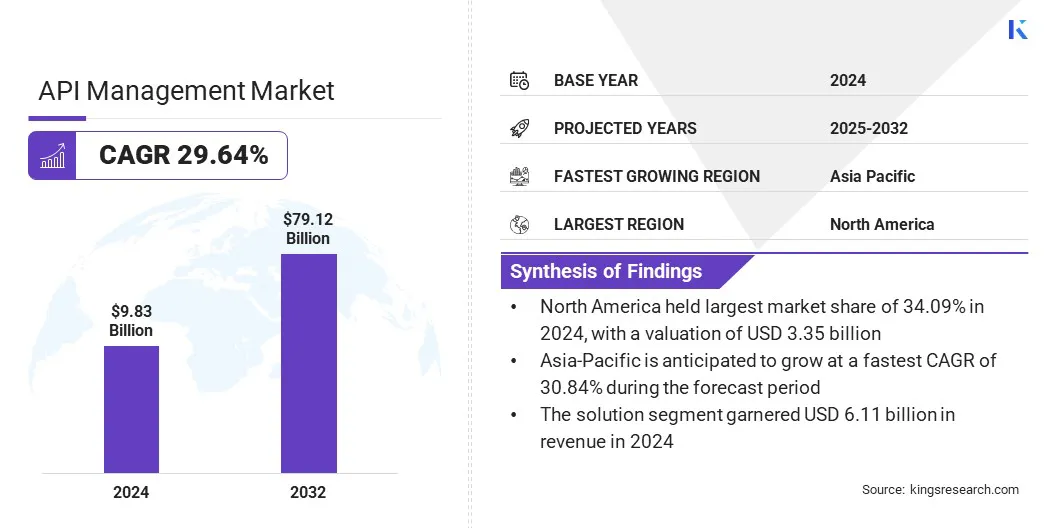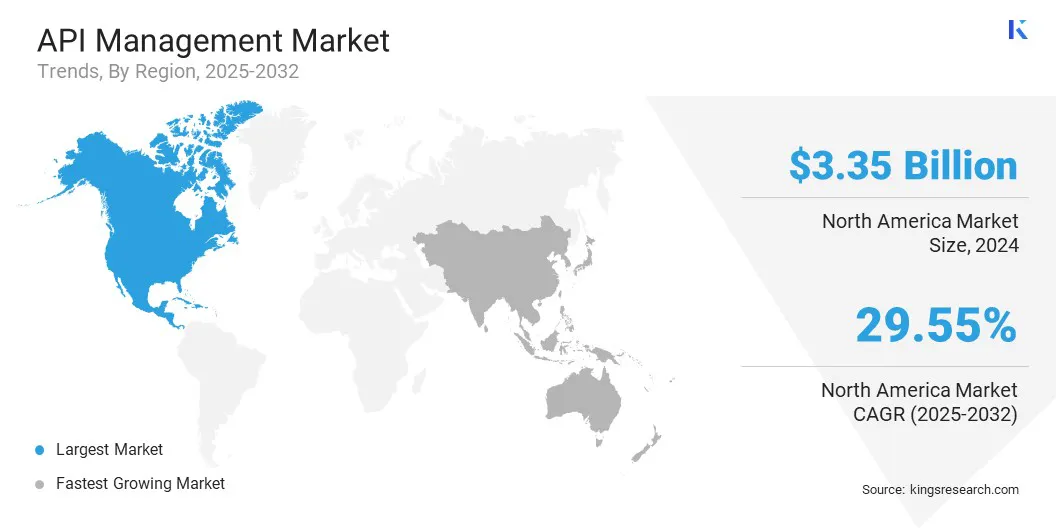Buy Now
API Management Market Size, Share, Growth & Industry Analysis, By Offering (Solution, Services), By Deployment (Cloud-based, On-premises), By Enterprise (Large Enterprises, Small & Medium Enterprises), By Vertical (IT & Telecommunications, Government, Retail, Healthcare, BFSI, Transport & Logistics, Others) and Regional Analysis, 2025-2032
Pages: 210 | Base Year: 2024 | Release: July 2025 | Author: Versha V.
API management refers to a set of tools and processes used to create, publish, monitor, and secure application programming interfaces (APIs) throughout their lifecycle. The market includes solutions such as API gateways, developer portals, analytics, authentication mechanisms, and traffic management tools.
It also covers the development, deployment, and commercialization of these solutions across various industries, including banking, retail, healthcare, telecommunications, and manufacturing.
The global API management market size was valued at USD 9.83 billion in 2024 and is projected to grow from USD 12.68 billion in 2025 to USD 79.12 billion by 2032, exhibiting a CAGR of 29.64% during the forecast period.
This growth is largely attributed to the rising demand for seamless system-to-system connectivity, enhanced digital experiences, and secure data exchange across enterprises undergoing digital transformation. Moreover, the increasing adoption of cloud computing, micro services architecture, and mobile applications is fueling the need for robust API management solutions that ensure scalability, governance, and performance.
Major companies operating in the API management market are Boomi, LP., Microsoft, Google LLC, Amazon Web Services, Inc., Postman, Inc., Kong Inc., IBM, Axway, Oracle, WSO2 LLC, Salesforce, Inc., Broadcom, Jitterbit, gravitee.io, and Workato.

|
Segmentation |
Details |
|
By Offering |
Solution (API Gateway, API Security, API Analytics, Others), and Services |
|
By Deployment |
Cloud-based and On-premises |
|
By Enterprise |
Large Enterprises and Small & Medium Enterprises |
|
By Vertical |
IT & Telecommunications, Government, Retail, Healthcare, BFSI, Transport & Logistics, and Others |
|
By Region |
North America: U.S., Canada, Mexico |
|
Europe: France, UK, Spain, Germany, Italy, Russia, Rest of Europe |
|
|
Asia-Pacific: China, Japan, India, Australia, ASEAN, South Korea, Rest of Asia-Pacific |
|
|
Middle East & Africa: Turkey, U.A.E., Saudi Arabia, South Africa, Rest of Middle East & Africa |
|
|
South America: Brazil, Argentina, Rest of South America |
Based on region, the market has been classified into North America, Europe, Asia Pacific, Middle East & Africa, and South America.
North America API management market share stood at 34.09% in 2024, valued at USD 3.35 billion. This dominance is attributed to the region’s advanced technological infrastructure, early adoption of digital transformation, and widespread implementation of cloud computing and micro services.
High demand for secure, scalable, and efficient API management solutions across industries such as finance, healthcare, and retail is further fueling market growth across North America.
Moreover, the presence of major API platform providers, continuous advancements in AI-driven automation, and a mature developer ecosystem are boosting regional adoption of API management solutions.
Government regulations supporting data privacy, along with growing investments in digital infrastructure and enterprise modernization, are further contributing to market growth. The region’s focus on innovation, API-first development strategies, and seamless integration across systems is aiding long-term growth.

The Asia-Pacific API management industry is set to grow at a CAGR of 30.84% over the forecast period. This growth is attributed to accelerating digital transformation, increasing enterprise focus on operational agility, and rising demand for real-time data integration across diverse industries.
The proliferation of mobile applications, cloud services, and Internet of Things (IoT) ecosystems is leading to the widespread adoption of API-driven architectures to support scalable and efficient connectivity.
Supportive government initiatives promoting digital infrastructure, along with a surge in technology-driven startups, are increasing investments in API management platforms. Local enterprises are prioritizing interoperability, automation, and developer enablement to maintain competitiveness in fast-evolving markets.
Additionally, the growing presence of global and regional API solution providers, combined with increased focus on data governance and compliance, is fostering innovation and bolstering regional market expansion.
The growing focus on developer engagement, operational agility, and omnichannel service delivery is supporting market expansion. Technological advancements API management platforms such as artificial intelligence-driven analytics, API automation, and low-code or no-code platforms are enhancing efficiency, security, and real-time monitoring capabilities.
These innovations, coupled with supportive regulatory frameworks and growing investments in IT infrastructure, are accelerating the global deployment of advanced API management platforms.
Surging Demand for Digital Solutions
The growth of the API management market is strongly propelled by the surging demand for digital solutions across sectors such as banking, retail, healthcare, and manufacturing, as industries aim to modernize operations, improve service delivery, and enhance customer experiences.
The widespread adoption of cloud computing, mobile applications and Internet of Things (IoT) technologies has made APIs vital for enabling seamless integration and secure data exchange between systems. This shift is particularly prominent in sectors such as finance, retail, healthcare and telecommunications, where digital transformation is reshaping business operations.
Organizations are increasingly investing in scalable and secure API management platforms to support agile development, meet compliance requirements, and maintain consistent performance. This momentum is further fueled by the growing need for rapid API deployment, system interoperability, and centralized API control.
With the expansion of digital ecosystems, API management is emerging as a critical component for enhancing connectivity, driving innovation, and improving operational efficiency supporting continued growth and advancements in API lifecycle tools.
Decentralized API Gateway Architecture
Decentralized API gateway architecture presents a significant challenge to the growth of the API management market, particularly for large and complex digital ecosystems. Many organizations deploy multiple API gateways across different cloud platforms, business units, or geographic regions in the absence of a unified management framework.
This fragmented setup leads to inconsistencies in policy enforcement, limited visibility into API usage, and increased complexity in monitoring and securing traffic flows. It also hampers the ability to scale services, respond to security threats, and comply with regulatory requirements uniformly. This results in operational inefficiencies and elevated risks when managing APIs in siloed environments.
To overcome these obstacles, organizations are increasingly adopting centralized API management strategies that unify gateway control and provide end-to-end visibility across environments.
For instance, Boomi, LP. employs a federated approach to managing multi-gateway environments, allowing enterprises to monitor and control various API gateways without the need to consolidate them into a single platform. This method maintains operational flexibility while ensuring a cohesive and unified management experience.
Additionally, the implementation of governance frameworks, API catalogs, and cross-platform monitoring tools ensures consistent security, performance, and compliance. Collaboration between IT architects, security teams, and platform providers is further enabling the development of cohesive and scalable API infrastructures that support business agility and digital transformation goals.
Adoption of AI-Driven API Automation and Analytics
The growing adoption of AI-driven API automation and analytics is influencing the API management market by enhancing operational efficiency, strengthening security, and accelerating development workflows.
AI-powered capabilities such as automated documentation, anomaly detection, and intelligent traffic routing are increasingly integrated into API platforms to reduce manual tasks and optimize performance. These tools enable faster issue resolution, improve API reliability, and provide deeper insights into usage patterns and performance metrics.
Advancements in machine learning, natural language processing, and predictive analytics are enabling the development of adaptive API management solutions capable of responding in real time to traffic surges, security threats, and evolving business needs.The expansion of digital ecosystems is making AI-driven automation and analytics essential components for managing complex and high-volume API environments.
The API management industry features major cloud providers and specialized platform vendors, striving to expand their market presence through innovation, ecosystem integration, and developer-centric solutions. Leading companies are investing in AI-driven automation, enhanced security frameworks, and support for hybrid and multi-cloud environments to address evolving enterprise needs across industries.
Vendors are also forming strategic partnerships, enhancing interoperability with third-party tools, and offering flexible deployment models to improve scalability and time-to-market. This evolving landscape encourages continuous innovation and strong competitive activity, as companies aim to advance digital transformation efforts and address the growing demand for agile, secure, and efficient API lifecycle management.
Frequently Asked Questions